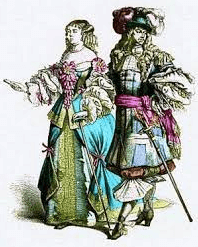What Was One Advantage Of Being A Member Of The Second Estate?

In the late 18th century, France was a country divided into three social classes known as estates. The First Estate consisted of the clergy, the Second Estate consisted of nobles and aristocrats, and the Third Estate included commoners such as peasants, merchants, and artisans. Each estate had its own privileges and responsibilities that were enshrined in law. However, it was the Second Estate that held most of the political power and wealth in pre-revolutionary France.
Being a member of the Second Estate meant holding a position of prestige within French society. It was akin to being part of an exclusive club where membership came with many advantages.
This article will explore one key advantage that members of this estate enjoyed over their peers in other estates. Through an objective analysis of historical records, we will examine how membership in this privileged class translated into tangible benefits for those who belonged to it. While acknowledging that there were criticisms about the Second Estate’s power imbalance over society at large, we will focus on exploring one specific advantage they enjoyed during this time period.
Overview of the French Revolution and the Three Estates
The French Revolution was a complex political and social event that divided French society into three estates, each with its own advantages and disadvantages.
The First Estate consisted of the clergy, who held significant power and wealth in the country.
The Second Estate comprised the nobility, who also held considerable power and wealth, but not as much as the clergy.
Finally, the Third Estate included everyone else in French society, including peasants and urban workers. This estate was by far the largest but had little to no representation in government or access to power.
The Revolution was triggered by various factors such as economic crises, Enlightenment ideas of democracy and equality, and tensions between estates.
It profoundly impacted European history by challenging traditional notions of monarchy and aristocracy while paving the way for modern democracies across Europe.
Political Power and Influence of the Second Estate
The Second Estate of the French Revolution was composed of the nobility, who held considerable political power and influence.
Members of this estate enjoyed several advantages, including access to government positions, the ability to shape policy, and a voice in decision-making processes.
This subtopic will explore these key points in more detail, analyzing how the Second Estate wielded their power during this pivotal period in history.
Access to Government Positions
One benefit of membership in the second estate was the ability to secure government positions based on social status rather than qualifications, exemplifying the adage ‘it’s not what you know, but who you know.’
This advantage ensured that members of the second estate could maintain their position in society and exert influence over policy decisions.
However, this practice also perpetuated a system where only those born into privilege had access to power and created an environment where corruption and favoritism thrived.
Members of the second estate were able to use their influence on taxation policies to ensure that they paid fewer taxes than members of lower classes.
This further reinforced their position at the top of the social hierarchy while limiting upward mobility for those outside of their class.
Despite its drawbacks, being a member of the second estate brought with it many privileges, including access to government positions and influence over policy decisions that impacted all aspects of society.
Ability to Shape Policy
Like a sculptor shaping clay, those with social status and political influence in the second estate were able to mold policies that reflected their own interests and beliefs. This advantage allowed them to have a significant impact on the direction of government decisions, often at the expense of those who lacked a voice in the decision-making process.
The ability to shape policy gave members of the second estate an immense amount of power and control over society, which they used to maintain their privileged position. However, this advantage also contributed to growing resentment among those who were excluded from the decision-making process, ultimately leading to calls for greater representation and democracy.
Voice in Decision Making
Through active participation and engagement in the decision-making process, individuals from all walks of life can contribute their diverse perspectives and experiences to shape policies that are inclusive and equitable for everyone.
As members of the second estate, individuals had a voice in decision making through their representation in parliament. This gave them an advantage over others as they were able to influence society by advocating for policies that aligned with their interests. However, it is important to note that this advantage was not equally distributed among all members of the second estate, as some held more power and influence than others.
Despite this limitation, having a say in policy-making allowed individuals to make a meaningful impact on society and ensure that their concerns were heard by those in power.
Wealth and Connections
Possessing extensive wealth and connections was a distinct advantage of belonging to the second estate, as evidenced by the fact that in 1789, the top two percent of French society owned approximately 25 percent of the nation’s total wealth.
This allowed them to enjoy a lavish lifestyle and access exclusive resources that were not available to those in lower social classes.
Moreover, their economic power enabled them to influence political decisions and gain favor from the monarch.
As members of the nobility, they had access to education and training that prepared them for leadership roles in government and military positions.
Additionally, their connections with other influential individuals gave them an edge over commoners who lacked such networks.
Despite these privileges, however, it is important to note that not all members of the second estate enjoyed equal advantages due to varying degrees of wealth within this class structure.
Education and Culture
Education and culture were important aspects of life for the French Second Estate. Access to education was a privilege primarily reserved for the nobility, who had access to private tutors, prestigious schools, and universities.
Patronage of the arts was also a significant aspect of their culture, as wealthy aristocrats commissioned famous artists and musicians to create works that reflected their wealth and status. These cultural pursuits helped define the identity of the Second Estate as sophisticated and refined members of society.
Access to Education
Membership in the second estate afforded individuals with access to specialized institutions and resources that facilitated the acquisition of knowledge and skills. One advantage of being a member of the second estate was having access to education, which provided opportunities for social mobility.
However, this educational privilege also had its drawbacks as it reinforced social hierarchies and perpetuated inequalities. Nevertheless, access to education allowed individuals from the second estate to cultivate their talents and skills, which could be leveraged for personal advancement or contribute to the betterment of society.
The benefits of education were not limited to academic pursuits but extended to cultural enrichment, refinement of manners, and development of critical thinking skills.
In conclusion, while membership in the second estate came with its share of advantages and disadvantages regarding education, it provided unparalleled opportunities for intellectual growth and advancement that were not available to other classes in society.
Patronage of the Arts
The nobility’s support and sponsorship of artists during the Enlightenment era served as a beacon of creativity and innovation, illuminating the cultural landscape with vibrant hues of artistic expression. The second estate had a significant influence on artists, providing financial support that allowed them to create works of art that would have otherwise been impossible.
This patronage not only gave rise to some of the most celebrated masterpieces in history but also played a crucial role in shaping cultural development. By supporting and promoting artistic endeavors, the second estate helped cultivate an environment that valued creativity, intellectuality, and imagination – all key elements of the Enlightenment movement.
At its core, this patronage represented one advantage of being a member of the second estate: access to resources that could be used to shape culture according to their own vision. However, despite this privilege, it is important to note that not all members of the second estate were equally supportive or involved in these endeavors; many lacked interest or simply did not see value in such pursuits.
Military and Defense
The Military and Defense was another crucial aspect of the Second Estate’s privileges. Members of this estate had access to leadership positions in the armed forces due to their social status, which allowed them to exercise greater control over military resources.
Additionally, they had access to institutional knowledge and training that provided them with an advantage in warfare. These privileges reinforced their position as a dominant force in society and fortified their interests against external threats.
Leadership in the Armed Forces
Commanding the armed forces provided an opportunity for members of the second estate to demonstrate their leadership skills and establish themselves as prominent figures in society. As leaders in the military, they were responsible for developing and implementing military strategy, which required a high level of strategic thinking and decision-making ability.
The second estate’s access to wealth and resources allowed them to equip their troops with the latest technology and weapons, giving them an advantage over their enemies on the battlefield. Additionally, being part of the second estate meant that these leaders had access to education and training that further enhanced their abilities as military commanders.
This advantage gave them prestige within society and allowed them to maintain their position of power even during times of political instability. However, it is important to note that this advantage was only available to a select few members of society, while most people did not have access to such opportunities due to social inequality.
Access to Military Resources
Access to military resources was a significant factor in determining the success of military leaders and their ability to maintain power, perpetuating social inequality and limiting opportunities for those without access.
Members of the second estate had advantages over others due to their privileged access to military resources such as weapons, horses, and armor. Their role in warfare was often as commanders or officers, and not necessarily as soldiers on the front lines. Furthermore, they had access to specialized training that enabled them to develop skills necessary for leading armies effectively. This ensured that they remained in control of the military forces and could use it to protect their interests.
However, this meant that those who were not members of the second estate were at a disadvantage when it came to accessing these resources and advancing through the ranks in the armed forces, perpetuating a system of social inequality.
Criticisms of the Second Estate
One critique of the Second Estate was their perceived entitlement and lack of accountability to the common people, which contributed to social unrest and ultimately led to their downfall.
The Second Estate enjoyed many privileges that were not available to the rest of society, such as exemption from taxes and access to high-ranking positions in government and military.
This divide between the nobles and the common people created a sense of inequality that fueled resentment towards the Second Estate.
Furthermore, the nobles often used their power for personal gain rather than for the betterment of society as a whole.
This resulted in an overall negative impact on French society, as resources were allocated towards serving the needs of a small elite rather than addressing broader societal issues.
As a result, when revolution eventually came, it was fueled by widespread anger towards this system of privilege and entitlement that had long been held by the Second Estate.
Legacy of the Second Estate
The lasting impact of the Second Estate on French society can be seen in the continued stratification of social classes and the persistence of elitism in certain institutions. The influence and privilege that members of this estate held allowed them to maintain their position at the top of society, even as pressures for change grew stronger.
This legacy has contributed to a culture where access to power and resources is still largely determined by one’s birth or social status. Additionally, some institutions, such as certain universities or exclusive clubs, continue to perpetuate an elitist mentality that reinforces these divisions.
While France has made significant progress towards greater equality since the Revolution, these vestiges of privilege serve as a reminder of how deeply ingrained inequality can be in a society.
Conclusion
The French Revolution saw the emergence of three social classes known as estates, each with their own unique set of advantages and disadvantages. The second estate, comprised of nobility, was granted privileges that were not available to the common people. This article explores one advantage of being a member of the second estate.
One significant benefit for members of the second estate was political power and influence. Nobles held high-ranking positions in government institutions and could sway decisions made by those in power. Their wealth also allowed them to finance their campaigns for political office or bribe officials to secure favorable policies.
Furthermore, due to their status, members of the second estate had access to better education and cultural experiences than those in lower classes. They were often sent to prestigious schools where they learned skills such as diplomacy, leadership, and etiquette that helped them navigate complex social situations.
However, despite these advantages, the second estate faced criticism from those who viewed their privileges as unfair and outdated. Many argued that birthright should not determine one’s opportunities in life.
In conclusion, while there were certainly benefits to being a member of the second estate during the French Revolution such as political power and access to education and culture – it must be understood that these privileges came at a cost. The legacy of this system is still felt today where society continues its ongoing battle against unjust class systems through movements like socialism or Marxism emphasizing equality over hierarchy using literary device allusion.





